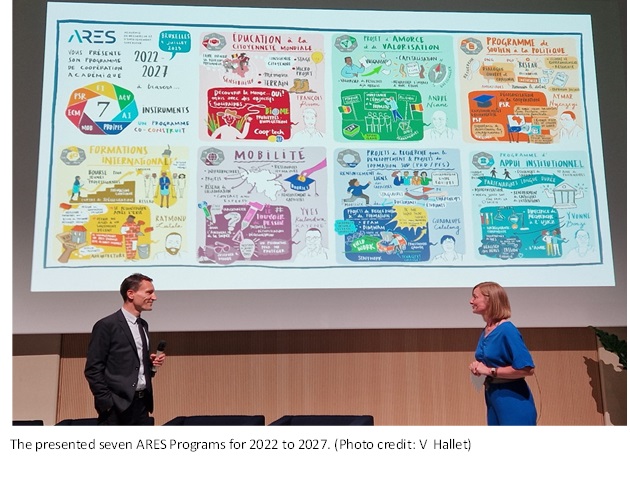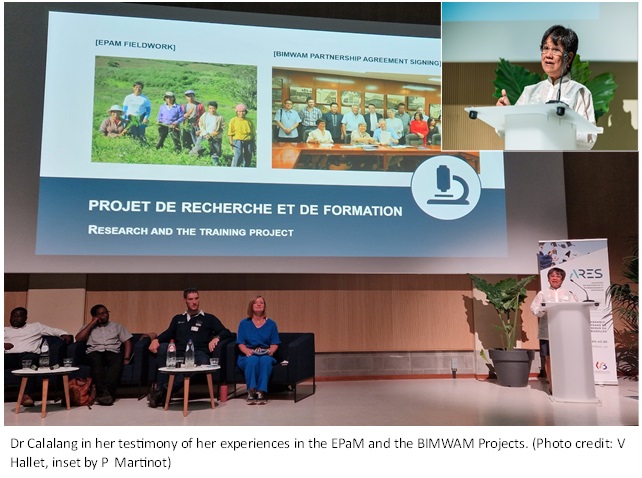The Académie de recherche et d'enseignement supérieur (ARES) presented the Academic Cooperation Program 2022 – 2027 at the Université libre de Bruxelles, the French speaking university in Brussels, Belgium on 4 July 2023 in collaboration with other universities in the Wallonia region.
Seven ARES instruments were presented during the event with the testimonies of actors who were selected from different recipient countries. These are the Institutional Support by Yvone Bonzi, Synergy Project Initiation and Valorization by André Niane, International Training by Raymond Lutala, Mobility by Yves Kulondwa, Global Citizenship Education by Francois Pirson, Policy Support Program by Aymar Nyenzeyi, and Research Project by Guadalupe Calalang. These programs aimed to contribute in providing academic response to the local and global challenges of sustainable development. The event highlighted the societal impacts of global academic cooperation.
 Dr Guadalupe D Calalang, from the Agricultural and Biosystems Engineering Department of Xavier University-Ateneo de Cagayan, talked about her involvement in two CUD (Commission of Universities for Development), now ARES projects. Her first project as a PhD researcher was the Towards greater human security in Mindanao by establishing strategic research partnerships to strengthen local governance in land and water management (EPaM) Project from 2010 to 2014. It was a partnership among universities in Belgium and the Philippines, the Universitè de Liege-Gembloux Agro-Biotech (ULg-GxABT), Universitè de Namur (UNamur) and Catholique Universitè Louvain (UCLouvain), the Environmental Science for Social Change (ESSC), Xavier University (XU) and Ateneo de Davao University (ADDU). This research aimed to develop a generic protocol for an integrated Land Information System (LandIS) applied to land use planning in Mindanao, Philippines.
Dr Guadalupe D Calalang, from the Agricultural and Biosystems Engineering Department of Xavier University-Ateneo de Cagayan, talked about her involvement in two CUD (Commission of Universities for Development), now ARES projects. Her first project as a PhD researcher was the Towards greater human security in Mindanao by establishing strategic research partnerships to strengthen local governance in land and water management (EPaM) Project from 2010 to 2014. It was a partnership among universities in Belgium and the Philippines, the Universitè de Liege-Gembloux Agro-Biotech (ULg-GxABT), Universitè de Namur (UNamur) and Catholique Universitè Louvain (UCLouvain), the Environmental Science for Social Change (ESSC), Xavier University (XU) and Ateneo de Davao University (ADDU). This research aimed to develop a generic protocol for an integrated Land Information System (LandIS) applied to land use planning in Mindanao, Philippines.

The second project was the Building up an integrated methodology for water resources assessment and management in urban coastal areas (BIMWAM) Project conducted from 2018 to 2023 where Dr Calalang acted as the South Project Coordinator. The BIMWAM Project partnership is composed of UNamur, UCLouvain and the University of Mons of Belgium and XU and University of St La Salle-Bacolod. The goal of this was to capacitate Philippine universities in terms of human resource and technical capabilities in groundwater science to respond to the demands of the field of expertise in Mindanao, Philippines.
Dr Calalang said she is thankful for BIMWAM’s contribution to the region of Mindanao. “The development of an expert in hydrogeology and its institutional support under the BIMWAM Project can have significant contributions to the management of our groundwater resources in the Mindanao region. In my region, hydrogeology is a rare profession. I am happy that the BIMWAM Project which is led by the University of Namur and with Prof Vincent Hallet as the North Coordinator, enables Xavier University with UMons to train a home-grown Hydrogeologist and provides institutional technical capabilities to cater to the demands of the service in this field of expertise.”
To sum up her experience, Dr Calalang highlighted three key words: character building, service and professional growth. “As a PhD researcher, I was able to practice the character-building values of courage, discipline, and tenacity. It takes courage to face the uncertainties of the PhD journey, the fear of uncompleted tasks, the peace and order situation of unfamiliar places where I conducted my fieldwork. “
She also expressed gratitude to CUD and ARES for the invaluable opportunity given to her. “I cannot repay the gifts given to me by CUD and ARES, thus I have to pay it forward, passing on these gifts to the younger generation through education and formation, providing them the training from the knowledge that I gained, handing over the torch to the next runner to continue on what has been bestowed to us by the Cooperation.”